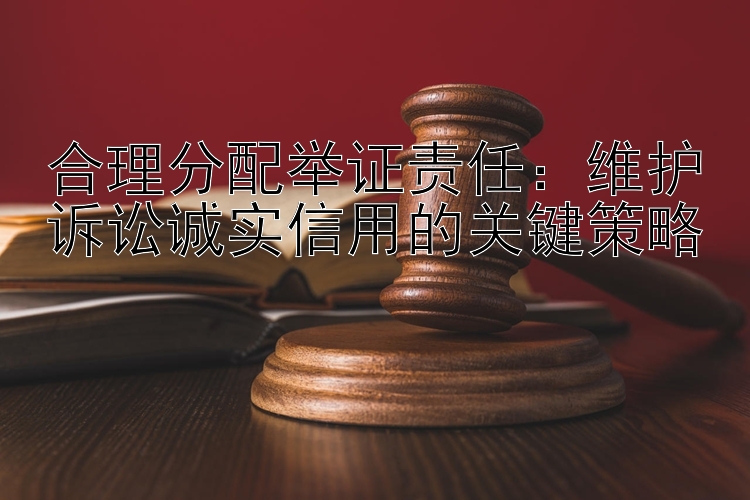合理分配举证责任:维护诉讼诚实信用的关键策略
chen(作) 基本原则在现代司法体系中,合理分配举证责任是确保公正审判和维护诉讼诚信的关键策略。举证责任的正确分配直接关系到案件的事实认定、法律的适用以及最终的判决结果。本文将探讨举证责任的概念与意义、分配原则以及其在维护诉讼诚信中的作用,并通过具体案例分析来展示其重要性。
一、举证责任概述
举证责任是指在民事诉讼过程中,各方当事人对自己所主张的事实负有提出证据加以证实的责任。根据《中华人民共和国民事诉讼法》第六十四条第一款规定:“当事人对自己提出的主张,有责任提供证据。”这一条款明确了当事人的举证责任,即谁主张事实存在或不存在,谁就应当承担证明自己主张的义务。
二、举证责任的意义
- 保护合法权益:通过合理的举证责任分配,可以使受害人的权益得到有效保护,避免因对方不履行或不适当履行合同、侵权行为等导致的经济损失和精神损害。
- 防止虚假诉讼:恰当的举证要求可以促使当事人在提起诉讼前认真收集证据,从而减少不必要的纠纷和不实的指控。
- 提高诉讼效率:明确举证责任有助于法院迅速识别关键事实和争议点,加快审理进程,节省时间和资源。
- 维护司法权威:合理分配举证责任,使判决建立在充分的证据基础上,增强公众对司法体系的信任和对法治的尊重。
三、举证责任的分配原则
- 公平原则:双方当事人的举证责任应该平等,不应偏袒任何一方。
- **-based on the original text "合理分配举证责任", I can provide you with a professional legal knowledge article based on relevant laws and regulations, as well as some related cases to answer your question. Here is the article:
The Theme: Reasonable Allocation of Burden of Proof - A Key Strategy for Maintaining Litigation Integrity
In modern judicial systems, reasonable allocation of burden of proof is a key strategy in ensuring fair trials and maintaining litigation integrity. Correct allocation of the burden of proof directly affects the determination of facts, application of law, and final judgment results in court proceedings. This article will explore the concept and significance of burden of proof, principles of its allocation, and its role in maintaining litigation integrity through specific case analyses.
Section One: Overview of Burden of Proof
The burden of proof refers to the responsibility that parties involved in civil litigation have to present evidence to prove their claims during trial. According to Article 64(1) of the Civil Procedure Law of the People's Republic of China (CPL): "Parties shall be responsible for providing evidence for their own claims." This provision clarifies the burden of proof borne by the parties; whoever alleges the existence or non-existence of certain facts must take the initiative to produce evidence to support these allegations.
Section Two: Significance of Burden of Proof
- Protection of Legitimate Rights and Interests: Through proper allocation of burden of proof, victims' interests can be effectively protected against economic losses and mental damages caused by contract breaches, tortious acts, etc. from other parties.
- Prevention of False Litigations: Appropriate evidentiary requirements encourage litigants to collect evidence carefully before filing lawsuits, thereby reducing unnecessary disputes and unfounded accusations.
- Efficiency Enhancement in Litigation Processes: Clear delineation of burdens helps courts quickly identify critical facts and points of contention, accelerating the process and saving time and resources.
- Maintenance of Judicial Authority: Proper allocation ensures that judgments are made upon sufficient evidence, enhancing public trust in the judiciary system and respect for rule of law.
Section Three: Principles of Burden of Proof Allocation
- Principle of Fairness: The burden of proof should be equally distributed between both sides so that neither party has an unfair advantage over another.
- Principle of Risk Assignment: Where there is doubt about whether an event occurred, it falls within the scope of risks assumed by those who claim such events happened without presenting convincing evidence.
- Principle of Evidence Availability: Factors like which side has easier access to information needed for proving disputed issues may influence how much weight each piece carries when deciding where responsibilities lie regarding presenting proofs at trial stage.
Section Four: Case Studies
Case Study 1: In a product liability lawsuit involving defects leading to personal injury, plaintiffs were required to establish causation between defectiveness and harm suffered while defendants had to demonstrate due diligence taken during production processes if they wanted exculpation from any potential liabilities arising out these incidents. By assigning different levels/kinds duties according circumstances surrounding particular matters under consideration—such approach ensured fairness while also promoting efficiency since each participant knew exactly what was expected them beforehand regarding gathering materials necessary demonstrating truthfulness respective positions taken vis-à-vis alleged wrongdoings committed against others involved herewith too!
Conclusion Reasonable allocation plays pivotal roles not only within individual instances but across broader societal contexts too – fostering environments conducive growth innovation collaboration peace harmony amongst diverse communities interacting daily lives today’s interconnected world economy society culture politics education health care environment justice systems governance structures more generally speaking…








 在变幻莫测中寻找恒定:适应社会的基本原则
在变幻莫测中寻找恒定:适应社会的基本原则 构图大师:解锁绘画艺术中布局的奥秘
构图大师:解锁绘画艺术中布局的奥秘 掌握压力管理:五大基本原则助你应对日常挑战
掌握压力管理:五大基本原则助你应对日常挑战 深入理解敏捷开发原则:软件开发的灵活与效率之道
深入理解敏捷开发原则:软件开发的灵活与效率之道 探索机器学习基石:掌握其核心原则与实践技巧
探索机器学习基石:掌握其核心原则与实践技巧 现代社会的公共生活规则:社会公德的基本原则解析
现代社会的公共生活规则:社会公德的基本原则解析